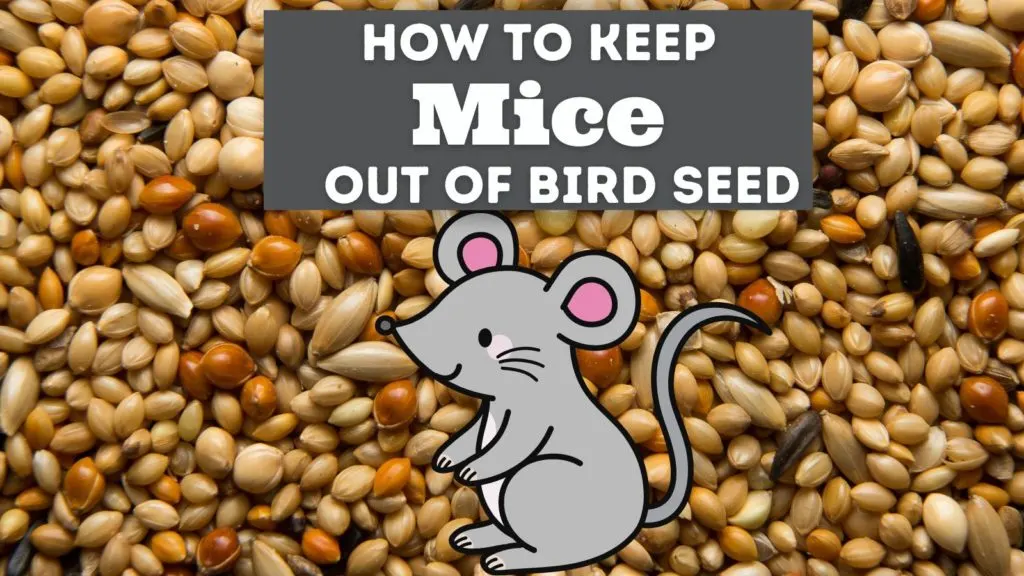Living in the country, field mice are a year around problem for us. We have to be extra careful to store bird food in a container they cannot chew into (and they will try!) These small rodents can easily infiltrate poorly stored bird seed, causing contamination and waste. But, like us, if you like to buy up seed in bulk or when you find it on sale, there are some great ways to store the seed safely and keep mice out of bird seed!

Use Airtight Containers
The first and most important step is to store your bird seed in airtight, rodent-proof containers.
Metal, glass or heavy-duty plastic containers with tight-fitting lids are ideal. Mice cannot chew through these materials, effectively keeping them out. For our feeder on our front porch, we keep our seed in a repurposed metal popcorn tin inside an antique ice box.
Ensure the lid seals completely to prevent any mice from squeezing in. At our house, we have a metal trash can on our back deck with the lid secured by a bungee that is hooked to the trash can handles on both sides of the bin. This not only keeps out mice but also raccoons and squirrels!
Elevate Your Storage
Keep your storage containers off the ground. Using shelving units or even hanging the containers can deter mice, as they prefer to stay close to the ground where they feel safer.
An elevation of just a few feet can make a significant difference.
Maintain a Clean Storage Area
Mice are attracted to food sources and will be more likely to invade if they find bird seed spillages around your storage area! It is so easy to drop just a few seeds when you fill the feeders–and even just those few seeds are a meal for a hungry mouse.
Regularly sweep and clean the area to remove any spilled seeds or debris. This not only helps in deterring mice but also maintains the hygiene of your storage space.
I also take the seed out to the feeders to fill them. We always have dropped seeds beneath the feeders anyway so I don’t have to worry about spilled seed out there–it will quickly become a meal for a ground feeding bird.
Inspect Regularly
Regularly check your bird seed containers for any signs of tampering, holes, or chew marks. Also, inspect the area around your storage for signs of mice such as mice droppings. Early detection can prevent significant infestations and protect your bird seed.
Consider Natural Deterrents
Some natural deterrents can help keep mice away without resorting to harmful chemicals. Here are several ideas but, with each, ensure these are kept away from the bird seed itself to prevent contamination.
Peppermint Oil
Mice tend to avoid the strong scent of peppermint oil. Soaking cotton balls in peppermint oil and placing them in areas where mice might enter your home or near food storage areas can help keep them at bay. Ensure to replace the cotton balls every few weeks or whenever the scent starts to fade.
Clove Oil or Cloves
Similar to peppermint, the strong scent of clove oil or whole cloves can deter mice. You can use them in the same way as peppermint oil, placing them in strategic locations around your home.
Ammonia
The smell of ammonia mimics the scent of predators’ urine, which can scare mice away. Small bowls of ammonia placed in areas where mice frequent can act as a deterrent. However, ammonia can be hazardous and should be used with extreme caution, ensuring good ventilation and keeping it away from pets and children.
Steel Wool and Copper Mesh
Mice cannot chew through steel wool or copper mesh, making these materials excellent for blocking entry points around your home. Filling holes and gaps with these materials can prevent mice from gaining access.
Bay Leaves
Bay leaves are another natural repellent; mice dislike their scent. Scatter bay leaves in your pantry, kitchen cabinets, or near potential entry points to deter mice.
Onion
The smell of onions can repel mice due to their pungent odor. However, onions can be toxic to pets if ingested and need to be replaced regularly to prevent rotting, making them a less desirable option for some households.
Cayenne Pepper, Garlic, and Cinnamon
Sprinkling these spices, or a mixture thereof, around areas where mice might enter your home can help deter them. Mice are put off by the strong scents, making these spices effective natural repellents.
Purchasing bird seed in bulk when it’s on sale can be cost-effective and ensure you always have a supply on hand. However, this makes storage even more critical. If you decide to buy in bulk, ensure you have adequate storage space and containers to keep the seed safe over time. The strategies mentioned above become even more important when storing larger quantities of bird seed!
More Posts You Might Like
What is the Best Wild Bird Seed to Buy?
Is It OK to Put Bird Seed on the Ground?
- 8 Letter Bird Names - August 14, 2024
- 7 Letter Bird Names - August 14, 2024
- 7 Birds Named After Famous People - July 23, 2024
